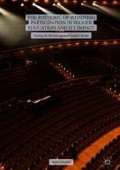Abstract
This chapter is concerned with ending the barriers against disabled people. It continues to draw upon the experiences and insights of the individuals participating in the Cutting Edge Theatre Initiative. As Burke (2012) notes, this involves much more than a ‘quick-fix’ to ‘lift barriers’ and likewise involves a nuanced understanding of the theoretical perspectives and the complex discourses of disability. Drawing upon the work of Ryan and Thomas (1998), Thomas (2001), and Souza (2002), this chapter identifies a number of additional exclusions/separations, alongside the family, education and work. These relate to attitudes, culture, finances, modern higher education and the individual. As will become apparent, the issue of the individual is problematic, particularly since this is also related to the notion of choice—it is not necessarily, as Thomas suggests, about ‘impairment’. The chapter offers an analysis of the various insights into the barriers experienced, exploring the multiple discourses, acts of resistance and revealing multiple inequalities.
Access this chapter
Tax calculation will be finalised at checkout
Purchases are for personal use only
Bibliography
Alec-Tweedie, E. (1912). Eugenics. Fortnight, 61, 854–865.
Barnes, C. (1991). Disabled people in Britain and discrimination: A case for anti-discrimination legislation. London: Hurst & Company.
Barnes, C. (1997). A legacy of oppression: A history of disability in western culture. In L. Barton & M. Oliver (Eds.), Disability studies: Past, present and future. Leeds: The Disability Press.
Bauman, Z. (1998). Thinking sociologically. Oxford: Blackwell Publishers Ltd.
Berger, P., & Luckmann, T. (1991). The social construction of reality: A treatise in the sociology of knowledge. London: Penguin Books.
Biko, S. (1987). I write what I like. Oxford: Heinemann Educational Publishers.
Burke, P. J. (2012). The right to higher education: Beyond widening participation. London: Routledge.
Burr, V. (1995). An introduction to social constructionism. London: Routledge.
Corbett, J. (1996a). Bad mouthing: The language of special education. London: Falmer Press.
Corbett, J. (1996b). Sharing skills: International perspectives on policy and practice. In S. Wolfendale & J. Corbett (Eds.), Opening doors: Learning support in higher education. London: Cassell.
ECU: Equality Challenge Unit. (2010). Statistical report 2010. [Available online] http://www.ecu.ac.uk. Accessed 26 Oct 2013.
Fairclough, N. (2001). Language and power (2nd ed.). Essex: Pearson Education Limited.
Foucault, M. (1967). Madness and civilisation: A history of insanity in the age of reason. London: Tavistock Publications Ltd.
Foucault, M. (1980). Power/knowledge; selected interviews and other writings. Brighton: Harvester Press.
Fullick, L. (2008). From compliance to culture change: Disabled staff working in lifelong learning, (summary report). Leicester: NIACE.
Goffman, E. (1963). Stigma: Notes on the management of spoiled identity. Middlesex: Penguin Books Ltd.
Goodley, D. (2000). Self-advocacy in the lives of people with learning difficulties. Buckingham: Oxford University Press.
Humphries, S., & Gordon, P. (1992). Out of sight: The experience of disability 1900–1950. Plymouth: Northcote House.
Kikabhai, N. (2014). ‘Resistance: Which way the future?’ A dual screen installation related to the theme of education and eugenics. Disability and Society, 29(1), 143–158.
Konur, O. (2004). Disability and racial discrimination in employment in higher education. In I. Law, D. Philips, & L. Turney (Eds.), Institutional racism in higher education. Stoke on Trent: Trentham Books Limited.
Mangcu, X. (2014). Biko: A life. London: I.B. Tauris & Co Ltd.
McGettigan, A. (2013). The great university gamble: Money, markets and the future of higher education. London: Pluto Press.
Oliver, M. (1996). Understanding disability: From theory to practice. London: Macmillan Press Ltd.
Riddell, S., & Watson, N. (Eds.). (2003). Disability, culture and identity. Essex: Pearson Education Limited.
Ryan, J., with Thomas, F. (1998). The politics of mental handicap (revised ed.). London: Free Association Books.
Shakespeare, T., & Watson, N. (2002). The social model of disability: An outdated ideology? Research in Social Science, 2, 9–28.
Souza, A. (with Ramcharan, P). (2002). Everything you ever wanted to know about Down’s syndrome but never bothered to ask. In P. Ramcharan, G. Roberts, G. Grant, & J. Borland (eds.), Empowerment in everyday life: Learning disability. London: Jessica Kingsley.
Synnott, A. (1997). The body social: Symbolism, self and society. London: Routledge.
Tamboukou, M., & Ball, S. J. (2003). Dangerous encounters: Genealogy and ethnography. Oxford: Peter Lang.
Thomas, L. (2001). Widening participation in post-compulsory education. London: Continuum.
Warnock, M. (1978). Special educational needs; ‘report of the Committee of Enquiry into the education of handicapped children and young people’, (Warnock report). London: Stationery Office.
Whittaker, J. (1999, May 23). Educational Apartheid, The Independent on Sunday, p. 31.
Whittaker, J., & Kenworthy, J. (2002). Education services: Why segregated special schools must close. In D. Race (Ed.), Learning disability – A social approach. London: Routledge.
Williams, R. (1966). Modern tragedy. London: Chatto & Windus Ltd.
Williams, R. (1981). Culture. London: Fontana Press.
Author information
Authors and Affiliations
Rights and permissions
Copyright information
© 2018 The Author(s)
About this chapter
Cite this chapter
Kikabhai, N. (2018). Ending the Barriers Against Disabled People. In: The Rhetoric of Widening Participation in Higher Education and its Impact. Palgrave Macmillan, Cham. https://doi.org/10.1007/978-3-319-75966-1_7
Download citation
DOI: https://doi.org/10.1007/978-3-319-75966-1_7
Published:
Publisher Name: Palgrave Macmillan, Cham
Print ISBN: 978-3-319-75965-4
Online ISBN: 978-3-319-75966-1
eBook Packages: EducationEducation (R0)

